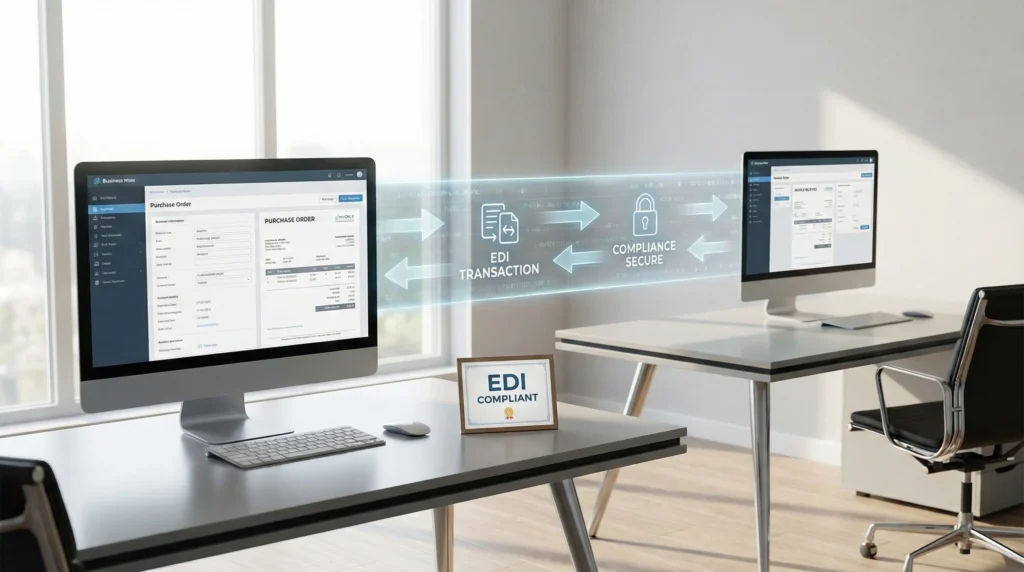Mastering EDI (Electronic Data Interchange) is crucial for vendors to excel in business dealings with major big-box retailers. This article zeroes in on EDI compliance, outlining the critical documents and procedures you need to conduct transactions effectively. Step into the world of EDI and ensure your business aligns with the electronic transaction standards of leading retailers for a successful partnership.
Key Takeaways
- Suppliers must comply with specific EDI standards and document formats (including X12 850 for Purchase Orders and X12 810 for Invoices) and frequently update their systems according to retailer revisions to maintain a seamless supply chain relationship.
- Choosing the right EDI integration partner is critical to ensuring seamless and compliant transactions, and automation via EDI solutions can help avoid chargebacks and streamline operations.
- EDI integration can have a substantial financial impact on businesses by automating processes, cutting manual operations costs, and providing the scalability necessary to handle larger volumes of transactions for growth.
Navigating EDI Guidelines
Achieving EDI compliance is an important prerequisite for companies aiming to become merchandise suppliers for big-box retailers. To do this, suppliers must manage specific EDI documents such as X12 850 for Purchase Orders and X12 810 for Invoices. Adhering to the ANSI X12 EDI standards is non-negotiable, as major retailers periodically update their guidelines to ensure compliance with current standards.
However, mastering these EDI guidelines doesn’t have to be overwhelming. With the right insights and understanding, suppliers can master the art of EDI integration and leverage it for seamless transactions with some of the world’s largest retailers.
Understanding EDI Documents
Understanding the EDI documents involved is the initial step towards mastering EDI integration. Retailers utilize a variety of EDI documents to facilitate efficient and accurate supply chain transactions with their suppliers. Essential EDI documents for suppliers include:
- X12 850 Purchase Order
- X12 855 Purchase Order Acknowledgment
- X12 810 Invoice
- X12 856 Ship Notice/Manifest
- X12 820 Payment Order/Remittance Advice
- X12 846 Inventory Inquiry/Advice
- X12 852 Product Activity Data
- X12 210 Motor Carrier Freight Details and Invoice
These business documents are integral in managing various aspects of business operations with big-box retailers, including:
- Purchase orders
- Acknowledging orders
- Invoicing
- Providing shipping details and shipping notices
- Remitting payment information
- Inventory management
- Sharing product activity data
Understanding how these documents function and interrelate is key to mastering EDI transactions, ensuring EDI compliance, and smoothing your business operations with major retailers.
Leveraging EDI for Enhanced Traceability
In addition to managing transactions, EDI plays a crucial role in enhancing product traceability, a vital component for maintaining high standards of safety and quality. Documents like the X12 856 Ship Notice/Manifest provide detailed insights into the logistics of shipped items, including batch numbers, shipping details, and delivery timelines. This data is essential for effective traceability, enabling suppliers to track products from origin to destination accurately.
Traceability is particularly important in scenarios like product recalls or when quality issues arise, allowing for rapid response and mitigation. By integrating EDI systems that efficiently handle traceability information, suppliers align more closely with stringent audit requirements, which emphasize transparency and safety throughout the supply chain. This strategic use of EDI not only streamlines operations but also bolsters compliance with safety standards, ensuring that products meet retailer expectations and regulatory demands.
The Importance of EDI Compliance
For suppliers dealing with big-box retailers, EDI compliance is a core requirement. Retailers require suppliers to adhere to specific and precise requirements, with a clear emphasis on the accurate formatting of EDI documents. Any deviation or non-compliance can lead to disruptions in service and high chargebacks, which could be detrimental to your business.
However, automating EDI transactions can offer a viable solution to these challenges. Automation significantly reduces the risk of incurring chargebacks by helping maintain accurate compliance with retailer requirements. Using advanced EDI solutions, businesses can streamline their EDI transactions, ensuring real-time visibility into transaction statuses and validation checks before submission. This not only ensures ongoing compliance but also enhances the efficiency and reliability of the EDI processes.
EDI Testing with Retailers
Before initiating live transactions, big-box retailers mandate suppliers to participate in EDI testing to confirm the precision and compliance to data exchange standards. This critical step is designed to ensure that all data exchanged between the supplier and the retailer is accurate and complies with the necessary standards.
Participating in this testing phase allows businesses to verify that their EDI systems are fully capable of handling transactions without errors. Using a retailer-compliant EDI solution during this phase is essential. These solutions enhance visibility and control throughout the transaction process, making it easier to identify and resolve any potential integration issues.
This not only streamlines the testing process but also ensures that businesses are well-prepared for smooth and reliable data exchanges once live operations commence.

Integrating EDI into Your Business Systems
For businesses, EDI integration represents a transformative change. It enables automation of key transaction document exchanges with business partners, improving efficiency for seamless global transactions. Integrating EDI solutions with your existing ERP system may involve API or middleware integration that helps to streamline processes. Regardless, this is an investment that promises substantial returns in efficiency and accuracy.
To become EDI compliant with major retailers, businesses can use simple and scalable EDI solutions that offer an all-in-one approach for EDI compliance and integration. These solutions help streamline business processes and ensure you meet specific requirements, making them ideal for companies looking to enhance their operational workflows.
Selecting the Right EDI Integration Partner
Selecting the right EDI integration partner is crucial for fulfilling retailer requirements and keeping systems updated with the latest EDI standards. An ideal partner acts as an extension of your company’s operations, helping to connect, automate, and expand your business’s capabilities. Key considerations for choosing an EDI partner include:
- Integration and Compatibility: Choose a partner with robust capabilities to integrate seamlessly with your existing ERP, CRM, and WMS systems. This ensures uninterrupted and efficient workflows that align with retailer technological frameworks.
- Compliance Expertise: Your partner should be well-versed in the specific compliance standards and protocols required by retailers, ensuring all transactions meet their stringent guidelines.
- Scalability and Support: Opt for a partner who offers scalable solutions that can adapt to growing transaction volumes and provides proactive support to handle any issues swiftly.
- Security and Real-Time Processing: Ensure the partner uses strict security measures to protect data integrity and supports real-time data processing for improved decision-making and responsiveness in your supply chain operations.
At ASC Software, we partner with leading EDI providers to ensure seamless functionality between our systems and the EDI framework. This collaboration enhances our EDI integration capabilities, facilitating efficient, secure, and compliant data exchanges that meet the high standards of partners like big-box retailers.
From Setup to Go-Live: The EDI Integration Process
With the right tools and processes, the transition from EDI setup to go-live can be seamless. Utilizing preconfigured solutions for EDI implementation helps meet trading partner’s requirements and facilitates a streamlined setup process with major retailers. This approach simplifies the implementation process and ensures that your EDI integration is operational promptly.
From the initial setup to full-scale operation, each step in the EDI integration process is meticulously designed and executed to ensure seamless data exchange and accurate compliance. The end result is a robust, reliable, and efficient EDI system that brings about transformative changes in how you conduct your business operations.
Troubleshooting Common EDI Integration Challenges
EDI integration brings along several unique challenges when working with major retailers. Some of these challenges include:
- Maintaining data accuracy
- Providing timely responses
- Avoiding mistakes and delays
- Preventing inefficiencies
- Avoiding potential chargebacks
It is important to address these challenges in order to ensure successful EDI transactions with big-box retailers.
However, outsourcing EDI setup can provide comprehensive support like managing end-to-end EDI testing and proactively modifying data mappings to meet trading partner requirements. This support mechanism acts as a safety net, ensuring that your EDI integration remains error-free and efficient, regardless of the volume or complexity of transactions.

Enhancing Supply Chain Efficiency with EDI Solutions
EDI solutions are designed to streamline communication and transaction processing between suppliers and major retailers. This powerful tool contributes to:
- Streamlining communication
- Enhancing transaction efficiency
- Enabling real-time data exchange
- Easing the process of order management
The ability to connect, communicate, and complete transactions in real-time has revolutionized the way suppliers engage with big-box retailers. It’s not just about compliance anymore; it’s about leveraging technology to build more efficient, responsive, and profitable supply chains.
Real-Time Data Exchange
Real-time data exchange offers the following benefits:
- Boosts inventory visibility and management via real-time tracking of inventory levels
- Prevents over-ordering or under-ordering, reducing profit loss
- Allows for quicker order approval, fast tracking, and efficient order fulfillment
- Can lead to increased cash flow due to faster order processing and reduced inventory storage costs
Moreover, the use of secure communication protocols is essential in connecting with major retailers for secure and reliable data transmission, ensuring the integrity of real-time data exchange. By leveraging advanced integration solutions, businesses can achieve real-time visibility over their transactions, leading to faster identification and resolution of errors.
Building Strong Supplier Relationships
Trust and reliability are of utmost importance in the retail world. Big-box retailers update their inventory information in real-time, ensuring suppliers and customers have access to current availability status. This transparency contributes significantly to building supplier trust, as it allows for more accurate planning and replenishment activities.
The use of electronic data interchange for instantaneous data exchange is an essential component for strengthening supplier relationships through reliable and efficient transactions. Implementing technology that supports accurate, real-time data flows can lead to improved collaboration and trust between retailers and their suppliers, paving the way for a stronger and more profitable business relationship.
Advanced Features of EDI Solutions
EDI solutions offer a wide range of advanced features that enhance standard EDI processes. These advanced solutions facilitate a more efficient and flexible way to exchange data with big-box retailers, reducing reliance on traditional EDI and enhancing the accuracy and efficiency of business processes.
Leading providers also support advanced connection capabilities, including pre-built connectors for smooth integration with back-end systems like ERP, TMS, and WMS. Additionally, cloud-based EDI platforms provide superior accessibility, allowing users to access essential features from any location with an internet connection.
Leveraging API for Enhanced Flexibility
APIs serve as powerful tools that offer enhanced flexibility in data exchange. Retailer APIs enable functionalities such as placing orders, managing inventory, and processing returns, which enhance the traditional EDI process flexibility. By connecting ecommerce systems and marketplaces to retailers using APIs, businesses can limit manual data entry errors and increase process efficiency.
Modern EDI platforms with API support offer the following benefits:
- Faster and more accurate integrations
- Real-time validations to facilitate smoother transactions
- Overcoming common challenges such as validation delays that are prevalent in retail EDI due to high transaction volumes
Analytics and Reporting Tools
With decision-making becoming increasingly data-driven, analytics and reporting tools have become essential for businesses. Advanced operational analytics dashboards allow suppliers to evaluate performance indicators to improve process efficiencies. EDI assists this process by providing real-time access to essential business data like sales transactions and inventory levels, supporting strategic business planning and informed decision-making.
These tools not only provide insights into current performance but also empower businesses to predict future trends, make informed decisions, and steer their business towards greater success. It’s not just about managing current operations; it’s about envisioning and shaping the future.
The Financial Impact of EDI on Your Business

Your business can experience a significant financial impact through EDI technology. It automates business processes, significantly reducing the costs of manual operations and document handling. While integrating an in-house EDI system involves a substantial initial investment in software mapping, data entry, licensing, hardware, and IT support, outsourcing EDI services can help companies save on IT costs by avoiding the expenses tied to software, hardware, and continuous maintenance that come with an in-house system.
Businesses can further reduce costs associated with labor, printing, storage, filing, and postage through the elimination of manual document handling via EDI. It’s a strategic move that not only enhances operational efficiency but also delivers significant cost savings.
Cost Savings and ROI
Adopting EDI can result in:
- Decreased document processing time.
- Reduced errors.
- Notable cost savings.
- Improved processing efficiency.
Once perceived as an expensive alternative, upon comparison, businesses have long since recognized the cost benefits of EDI over traditional methods like fax or email for advance ship notices.
The ROI of EDI takes into account both direct costs such as salaries and indirect costs, including overheads for the order fulfillment team. Over a three-year period, the return on investment for EDI software can be substantial, assuming there are enhancements in profit margins and net cash flows.
Scaling Your Operations with EDI
EDI empowers businesses to handle a larger volume of documents/orders efficiently, a key factor for scaling operations. By standardizing electronic communications, EDI enhances both efficiency and compliance, which facilitates operational scaling with trading partners like big-box retailers.
With EDI, you can handle increased transaction volumes without compromising efficiency or accuracy. It’s an enabler for growth, allowing you to expand your operations and engage with more trading partners without being hindered by manual processes or data inaccuracies.
ASC Software’s Integrated EDI Capabilities
At ASC Software, we specialize in advanced warehouse management systems (WMS), manufacturing execution systems (MES/MRP), and warehouse control systems (WCS). To enhance these core offerings, we partner with leading EDI providers to deliver seamless EDI integration solutions. This collaboration ensures that our supply chain solutions not only meet but exceed the demands of modern business operations, providing compliance and competitive advantages in today’s fast-paced market.
Key Features:
- Enhanced Operational Efficiency: Through our partnership with top EDI providers, we automate the exchange of key business documents, significantly boosting efficiency and accuracy across your supply chain.
- Seamless System Compatibility: Our EDI solutions are designed to integrate effortlessly with our WMS, MES/MRP, and WCS, maintaining data consistency and eliminating operational silos.
- Real-Time Error Checking: With real-time validation and error correction, we uphold the highest standards of data quality.
- Scalable Solutions: Our EDI integration scales with your business, supporting growing data volumes and an expanding network of trading partners.
- Versatile Format Support: Adapts to various EDI formats and standards, ensuring seamless communication with diverse trading partners without the need for custom modifications.
Leveraging ASC Software’s integrated EDI capabilities within your supply chain management strategy does more than simplify compliance—it enhances your entire operational framework. As a powerful warehouse system provider that ensures seamless EDI integration through strategic partnerships with leading EDI providers, we help your business achieve unparalleled efficiency and reliability. This comprehensive approach not only streamlines operations but also strengthens your competitive edge in the marketplace. Trust ASC Software to deliver robust, integrated solutions that propel your business towards sustained growth and success.
Conclusion
Mastering EDI compliance with big-box retailers is more than a requirement; it’s a strategic advantage that can significantly enhance operational efficiency, accuracy, and profitability. Throughout this article, we’ve explored the importance of understanding EDI documents, the necessity of compliance, and the benefits of integrating sophisticated EDI processes within your business operations. As you navigate the complexities of retailer EDI guidelines, remember that the right tools and partnerships can transform challenges into opportunities for growth.
At ASC Software, we recognize the importance of seamless integration and robust functionality in EDI processes. By partnering with leading EDI providers, we ensure that our advanced warehouse management systems, along with our comprehensive supply chain solutions, are not only compliant but also competitive and efficient. Our integration capabilities allow you to leverage the power of EDI to streamline operations, enhance data accuracy, and scale effectively in the competitive retail landscape.
Ready to transform your supply chain operations and excel in EDI compliance? Contact ASC Software today to learn how our integrated solutions can elevate your business efficiency and set you up for success in a dynamic market. Let’s build a smarter, more connected supply chain together.
Frequently Asked Questions
What are the essential EDI documents for suppliers?
The essential EDI documents for suppliers are X12 850 Purchase Order, X12 855 Purchase Order Acknowledgment, X12 810 Invoice, X12 856 Ship Notice/Manifest, X12 820 Payment Order/Remittance Advice, X12 846 Inventory Inquiry/Advice, X12 852 Product Activity Data, and X12 210 Motor Carrier Freight Details and Invoice.
How does automation help in EDI compliance?
Automation in EDI transactions helps maintain compliance by eliminating manual errors, ensuring timely and accurate data exchange, and reducing the risk of chargebacks. This leads to more reliable and efficient compliance with trading partner requirements.
What are the benefits of real-time data exchange in EDI solutions?
The benefits of real-time data exchange include improved inventory visibility, enhanced management through real-time tracking of inventory levels, quicker order approval, fast tracking, and efficient order fulfillment. This helps streamline operations and improve overall efficiency.
How does API integration enhance EDI processes?
API integration enhances EDI processes by providing a more efficient and flexible way to exchange data, reducing reliance on traditional EDI and improving the accuracy and efficiency of business operations.
What is the financial impact of EDI on businesses?
Implementing EDI technology can lead to significant cost reductions for businesses by streamlining manual operations and document handling, as well as enabling more efficient processing of a higher volume of documents and orders, essential for scaling operations.




